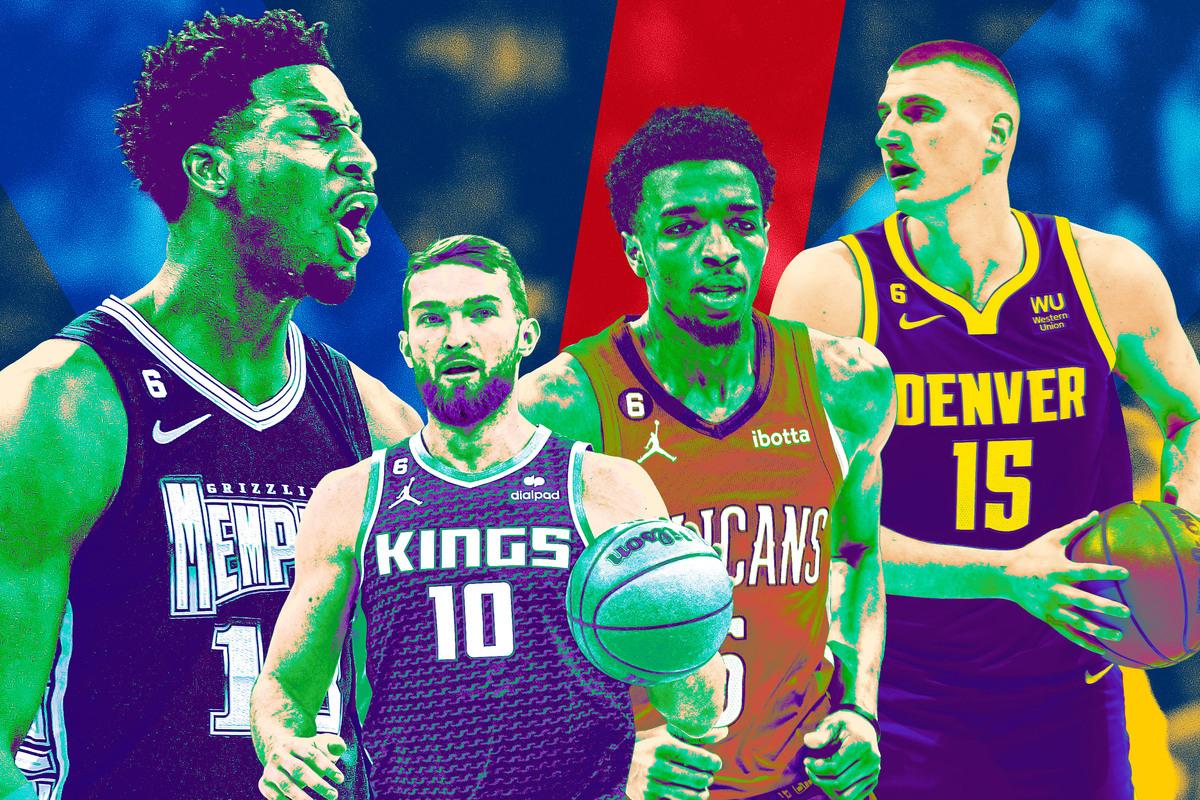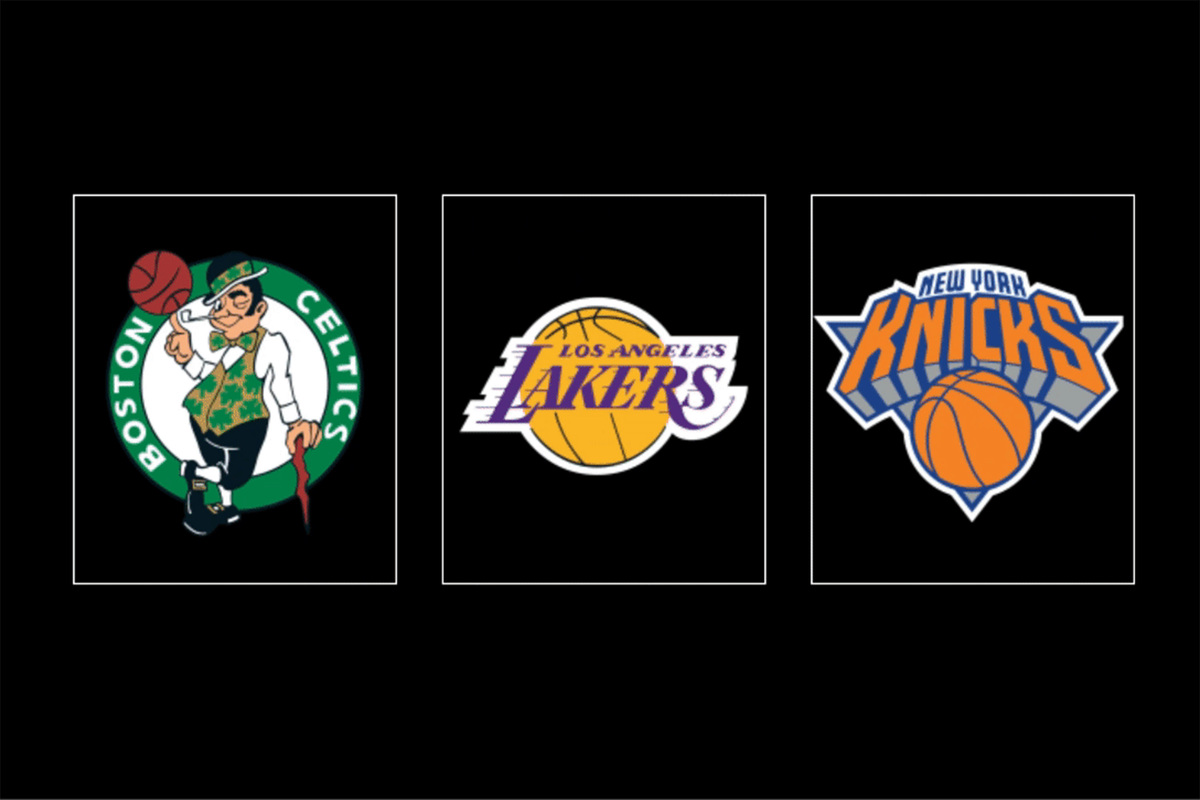
We expected parity without recent precedent in the West this season, and the conference delivered with aplomb. The Nuggets won the no. 1 seed with a mere 53-29 record—the worst for the regular-season Western winner since the 1978-79 SuperSonics went 52-30. And the Grizzlies boasted the best point differential, at just plus-3.9 per game—the lowest mark for the West’s leader since the 1983-84 Lakers, at plus-3.8.
The conference’s tight spread of talent presages a potentially provocative postseason, with upset possibilities and compelling matchups and no clear favorite to advance to the Finals. Put simply, none of the West’s 10 remaining teams resemble a typical champion.
This chart shows the regular-season offensive and defensive rankings for every championship team since 1996-97 (the first season for which NBA.com has play-by-play data and, thus, net ratings). Other than last season’s Warriors and the defensively dominant 2003-4 Pistons, every team on this list ranked in the top 11 in offensive rating. And other than the 2000-1 Lakers—the most famous save it for the playoffs team in NBA history—every team on this list ranked in the top 11 in defensive rating as well.
Offensive and Defensive Rankings for NBA Champions
The takeaway is clear: Two-way balance matters. That’s good news for the top of the Eastern Conference this season, as three such teams—Boston, Philadelphia, and Cleveland—ranked in the top 11 on both offense and defense. A fourth Eastern team, Milwaukee, finished just 15th on offense; the Bucks will try to match the 2021-22 Warriors as a contender aiming to win with an elite defense, two-time MVP leading the offense, and recent track record of postseason success.
But in the West, only one team (barely) fits this criterion, and every team has obvious, potentially exploitable flaws entering the playoffs. The Ringer’s NBA Odds Machine isn’t convinced that any of these 10 teams are all that impressive; it doesn’t give any Western Conference team better than a 70 percent chance to reach the second round, and it thinks an Eastern team is much more likely to win the title than a Western one.
To investigate why the West looks so wide open, let’s dive deeper into the imbalanced rosters populating this playoff field. The 10 teams left in the West fit into four broad profile groupings, starting with the best two-way candidates of the bunch.
Top Two-Way Candidates
Memphis Grizzlies: 11th on offense, third on defense
Phoenix Suns: 14th on offense, seventh on defense
By a margin of 0.1 points per 100 possessions, the Grizzlies just barely sneaked into the top 11 on offense, giving them the best two-way résumé of any team in the conference. Memphis looks like a real contender, and not only because of that extra 0.1 ticks of offensive rating: The Grizzlies have the best net rating in the West, the no. 2 seed for the second consecutive season, and the best title odds of any Western team, per our playoff model.
But the Grizzlies are far from shoo-ins to reach the Finals, and their two-way plaudits crack a bit under close inspection. Memphis’s offensive capabilities are already stretching the boundaries of two-way contention, and the team ranked just 22nd in half-court efficiency, per Cleaning the Glass. The Grizzlies compensated with the league’s top transition rate, according to CtG, but those opportunities might fade in the postseason.
Moreover, two of their top three big men, Steven Adams and Brandon Clarke, are out for the postseason due to injuries. Adams’s absence could prove particularly costly against locked-in playoff defenses: Next to transition play, the Grizzlies’ greatest offensive advantage is their proclivity for grabbing their own misses and producing extra chances, but they fall from by far the league’s best offensive rebounding team with Adams to below average without their burly Kiwi center.
While Ja Morant is the team’s top scorer, Jaren Jackson Jr. best epitomizes the dilemma in trusting Memphis to score sufficiently in the playoffs. He’s a proven defensive ace as this season’s per-game blocks leader and Defensive Player of the Year favorite. Plus, his offense has improved by leaps and bounds, as he poured in a career-high 18.6 points per game on career-best efficiency. But will the latter sustain against focused playoff defenses? The answer could dictate whether Memphis goes as far as the Finals or is eliminated as early as the first round.
The Suns offer considerably greater two-way potential, as they finished the season with a top-10 defense and now have Kevin Durant to bolster a mediocre-on-paper offense that was admittedly dragged down by a Devin Booker injury. Early returns were promising, if abbreviated due to Durant’s sprained ankle: In 269 minutes with Durant, the Suns have scored at a better rate than any team other than the Kings this season, pouring in 117.7 points per 100 possessions, per NBA Advanced Stats, and on the other end, they’ve surpassed even the stingiest defense in the league by allowing just 107.0 points per 100 possessions.
It’s hard to read much into that sample because of both its meager size and the caliber of competition it comprises. The Suns are 8-0 with Durant, but discounting two wins over the Nuggets—because Denver was playing without Nikola Jokic, Jamal Murray, Michael Porter Jr., and Kentavious Caldwell-Pope—the best team Phoenix played in those games was the eighth-seeded Timberwolves. Its competition will turn a lot more challenging right away, when the Clippers visit Phoenix in the first round next weekend.
But still, if there’s one Western team with the most potential to pair a top offense with a top defense this spring, it’s clearly Phoenix—and that’s why the Suns with Durant are betting favorites to advance to the Finals.
One-Way Candidates Skewed Toward Offense
Denver Nuggets: fifth on offense, tied 15th on defense
Sacramento Kings: first on offense, tied 23rd on defense
Golden State Warriors: 10th on offense, 14th on defense
Perhaps Jokic, Murray, and Porter can outscore opponents for a few rounds, as Denver’s defensive troubles this season mostly plagued its bench units, which will presumably play less often in the playoffs. Among players with at least 1,000 minutes this season, the three largest on-off differentials all belonged to Nuggets: Jokic plus the two best defenders in the Denver starting lineup.
Largest On-Off Differentials in 2022-23
But refer to the chart up at the top of this piece again: Only one champion in the last 26 years has finished worse than 11th in defensive rating in the regular season, and it’s difficult to equate the Nuggets with the defending champion 2000-1 Lakers. Those Lakers could flip a switch and did, posting the best defensive rating in that postseason; these Nuggets don’t seem to have a remotely comparable switch to flip.
Throughout this entire season, even as they coasted to the no. 1 seed, the Nuggets barely put together any championship-caliber defensive stretches. Split the season up into months, and there’s still only one (January) when the Nuggets ranked in the top 11 on defense. They were otherwise just consistently, worryingly mediocre, with solid defense in every area on the court except the most important: Opponents shot 71 percent at the rim against Denver, per CtG, the second-highest mark in the league.
A similar problem befalls the Kings, who are even more extreme than Denver—with a better offense but worse defense than the already extreme Nuggets. Under coach Mike Brown, the Kings have stout defensive principles, but the personnel that give Sacramento such a unique, dynamic offense also hold them back from executing on the other end.
The Kings rank 11th in their opponents’ expected effective field-goal percentage based on shot locations, per CtG. But they fall to 27th in their opponents’ actual eFG% because Domantas Sabonis—like Jokic, his fellow passing center—is a poor rim protector and their wings lack the proper size to challenge perimeter shooters. In other words, Sacramento tends to force shots that should be tough but aren’t because of the players contesting them.
Since 1996-97, 22 teams before these Kings have reached the playoffs with a defense that ranked 23rd or worse in the regular season. Only six won any playoff series, and only one of those lucky few comes from the last decade:
Bad-Defense Teams With Playoff Series Wins
The good news for Sacramento, though, is that all of those teams had two traits in common. First, they were all top-four seeds, meaning they benefited from home-court advantage in the first round. That factor could be especially crucial for the Kings, who are seeded third in the West and playing the Warriors, who were historically lousy on the road this season (even if such splits tend not to persist into the postseason).
Second, all those teams compensated for a subpar defense with a top-five offense; half of the group had the top offense in the league, as do this season’s Kings. Both the 2009-10 Suns and 1998-99 Pacers reached the conference finals with the exact no. 1 offense and no. 23 defense combo that the Kings possess.
Finally, thanks to a 157-point outburst against the tanking Trail Blazers in the Warriors’ final game of the regular season, the latter leapt into the top 10 of the league’s offensive leaderboard. Yet offense was never the problem during this seesaw Warriors season because last season’s champions showed they can succeed even with mediocre scoring.
Rather, the not-so-secret secret of the Warriors dynasty is that, for as much as Steph Curry redefined and modernized NBA offenses, the team’s defense has always been just as important for its championship hopes. Since 2015, the title-winning Warriors ranked first, second, 11th, and second in defensive rating. But they fell to 14th this season, almost entirely because of their road woes—and now have to confront those challenges head-on against the league’s best offense in Sacramento.
One-Way Candidates Skewed Toward Defense
Minnesota Timberwolves: 23rd on offense, tied 10th on defense
New Orleans Pelicans: tied 20th on offense, sixth on defense
Most of the NBA’s best defenses reside in the East: four of the top five teams this season and six of the top nine. Separating Phoenix into a higher tier leaves only two Western clubs in this no-offense, all-defense category.
Historically, there’s not much of a difference between how good-offense, bad-defense and bad-offense, good-defense teams fare in the postseason: Imbalanced teams all tend to underperform, regardless of which direction they skew. So ignore any “defense wins championships” clichés that might make Minnesota or New Orleans seem more appealing—neither team is well positioned to make real playoff noise.
The Timberwolves are in a strange situation as they enter the play-in round. Their defensive potential took a tumble on Sunday, when Rudy Gobert punched teammate Kyle Anderson during a timeout and All-Defense candidate Jaden McDaniels punched a wall and broke his hand. Stop punching, Minnesota! If anything, the Wolves might have to rely on their offense going forward—especially with Karl-Anthony Towns back in the fold after missing two-thirds of the season with a calf strain.
Meanwhile, despite Brandon Ingram’s best efforts, the Pelicans offense has struggled ever since losing Zion Williamson to a hamstring injury. The team reflects Herb Jones more than anyone else now; it is rangy on defense, but a shaky offense limits its two-way ceiling.
Zero-Way Candidates
Los Angeles Clippers: tied 17th on offense, 17th on defense
Los Angeles Lakers: 19th on offense, tied 12th on defense
Oklahoma City Thunder: 16th on offense, tied 12th on defense
This final group of remaining Western teams is reserved for those that don’t rank in the top 11 league-wide in either offense or defense. That’s not typically a recipe for playoff success: Since 1996-97, only five teams in this category have won a playoff series, and none have advanced to the conference finals:
Teams With No Top-11 Ranking and Playoff Series Wins
The Thunder were the most obvious candidate to end up in this no-man’s-land. Even reaching the play-in tournament represents a pleasant surprise for Oklahoma City, which had been projected to win just 23.5 games.
The fifth-seeded Clippers, however, seem like an archetypal two-way threat: They have Kawhi Leonard playing like a superstar again, a deep roster around him, and the third-best 3-point percentage in the league. And yet a lack of identity, persistent turnover problems, and an uncertain rotation conspired to give them a below-average rating on both ends instead.
Their Crypto.com Arena brethren are at least closer to demonstrating strength on one side of the ball: The Lakers defense powered them to the bubble title in 2019-20, and Anthony Davis, LeBron James, and midseason acquisition Jarred Vanderbilt lead a unit that placed just 0.1 points per 100 possessions outside the top-11 threshold this season. That’s not a meaningful distinction; place the Lakers in the same category as the Timberwolves and Pelicans if you want. (Also, those teams are all in the play-in bracket together—as are the Thunder, who are also just 0.1 points per 100 possessions outside the top 11 in defensive rating.)
But the Lakers still don’t look like a properly balanced championship club. The offense has improved, as expected, since a disastrous start, but it will struggle to generate points against the Grizzlies if L.A. faces the West’s best defense in the first round. Relative to the rest of the league, the Lakers offense was 2004-Pistons-level bad this season—and the defense isn’t anywhere close to 2004-Pistons-level good.
(Yes, the Lakers did boast the West’s best record since the All-Star break. They also beat up on a ton of teams resting starters over that span, and more important, momentum heading into the playoffs doesn’t matter. As I wrote a few years ago, every historical indicator says that a team’s performance over the whole 82-game season is much more predictive than its performance over the last 10 or 20 or 41 games.)
Because of their two-way mediocrity, the Clippers, Lakers, and Thunder also all posted a net rating of plus-1.0 per 100 possessions or worse. (The Timberwolves did too, as did the Heat and Hawks in the East.) Since 1996-97, 94 teams have reached the playoffs despite a regular-season net rating of plus-1.0 per 100 possessions or worse. Only 14 of them (15 percent) won a single playoff series. And only one of them advanced more than one round.
Naturally, that team was the 2017-18 Cavaliers, who were plus-1.0 but relied on LeBron’s brilliance to win the East. Maybe LeBron can do it again in a weak conference?
After all, an atypically flawed team will make the Finals, while all of the NBA’s two-way Goliaths battle it out in the Eastern bracket.


